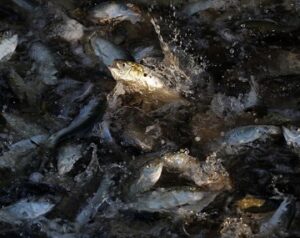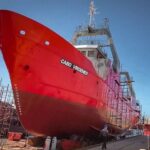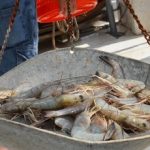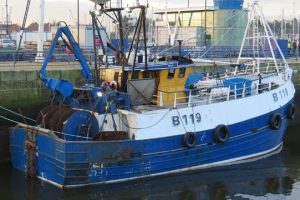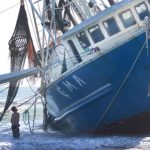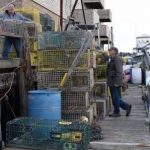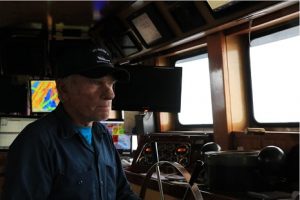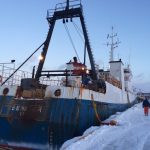The controversial menhaden fleet that supplies Omega Proteins’ Reedville plant is promising to limit areas in Chesapeake Bay where it will set its nets and catches fish. In a memorandum of understanding with the state, Ocean Harvesters said it wants to limit potential areas of conflict with other users of the Bay. Conservationists and recreational fishermen had pushed for limits, with some calling for an outright ban on catching menhaden in the Bay, after two spills of dead menhaden last year washed ashore. >click to read< 08:01
Tag Archives: Omega Protein
Pushing pogy boats farther from Louisiana coast could dampen profits, kill jobs, report warns
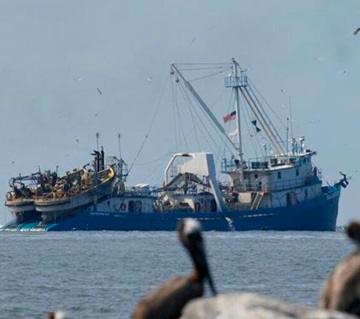 Pushing commercial menhaden fishing farther off the Louisiana coast may appease anglers and conservationists, but it would come at a heavy cost to the industry, according to a new report from state economists. The two companies operating what amounts to Louisiana’s largest fishery could lose about $31 million per year and shed up to 90 jobs if the state approves a plan to restrict menhaden fishing within a mile of the coast, an economic impact report by the state Department of Wildlife and Fisheries says. But the report’s lead author stressed that the industry could recoup some losses by fishing in deeper water. “They’d likely adjust practices,” Fish and Wildlife economist Jack Issacs said. “They’d make adjustments to counteract (the restrictions). The menhaden industry would likely take more trips offshore or concentrate more harvesting outside the mile-wide buffer.” Photos, more, >>click to read<< 12:38
Pushing commercial menhaden fishing farther off the Louisiana coast may appease anglers and conservationists, but it would come at a heavy cost to the industry, according to a new report from state economists. The two companies operating what amounts to Louisiana’s largest fishery could lose about $31 million per year and shed up to 90 jobs if the state approves a plan to restrict menhaden fishing within a mile of the coast, an economic impact report by the state Department of Wildlife and Fisheries says. But the report’s lead author stressed that the industry could recoup some losses by fishing in deeper water. “They’d likely adjust practices,” Fish and Wildlife economist Jack Issacs said. “They’d make adjustments to counteract (the restrictions). The menhaden industry would likely take more trips offshore or concentrate more harvesting outside the mile-wide buffer.” Photos, more, >>click to read<< 12:38
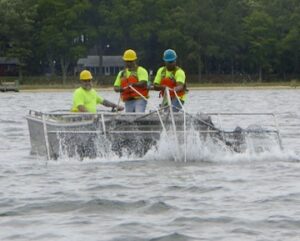
Omega Protein and Fishing Partner Ocean Harvesters Successfully Test Fish Spill Response Vessel
Ocean Harvesters, the exclusive fishing partner of Omega Protein, is continuing its commitment to responsible stewardship of the Chesapeake Bay with the deployment of a new response team and recovery vessel to more effectively respond to rare incidents like net tears and fish spills. As part of this effort, Ocean Harvesters, in cooperation with the Virginia Marine Resources Commission (VMRC), has successfully tested a skimmer vessel, which will arrive at the scene of a net tear and work to recover spilled fish from the surface that threaten shorelines. This vessel will begin operating in the Bay with this upcoming fishing season. photos, video, >click to read< 09:57
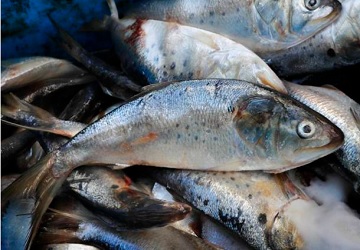
Virginia Regulators to Consider Changes to Menhaden Fishing Regulations
Virginia regulators will consider changes to commercial menhaden fishing in the Chesapeake Bay following requests from recreational anglers to put an end to the fishery. The proposals follow repeated requests from the Virginia Saltwater Sportfishing Association to stop menhaden fishing in the Bay, including a petition of 11,000 signatures that was presented to the office of Republican Gov. Glenn Youngkin earlier this year. Reedville-based Omega Protein, the lone player in the Bay’s menhaden reduction fishery, which processes catches into fishmeal or fish oil, says the new regulations take away available fishing grounds that include uninhabited areas. Taking operations completely out of the Bay into less safe conditions in the ocean would ultimately force the company to stop operating. >click to read< 11:51
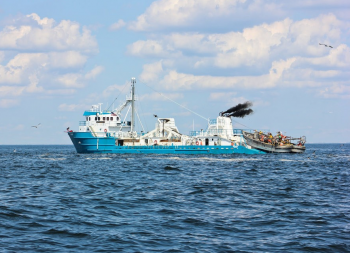
Menhaden Harvest Increase Approved as Anglers Petition to Close Bay Fishery
East Coast fishery managers have approved increasing commercial harvests of Atlantic menhaden from Maine to Florida. The Atlantic States Marine Fisheries Commission (ASMFC), which regulates near-shore harvests of migratory fish, voted Wednesday to set a new ceiling on the coastwide menhaden catch of 233,550 metric tons, a 20 percent increase over the current quota. The longstanding cap on harvest in the Chesapeake Bay remains unchanged, at 51,000 metric tons. But conservationists and sports anglers continue to worry about the impact to the Bay from large-scale fishing of menhaden near its mouth. >click to read< 13:54
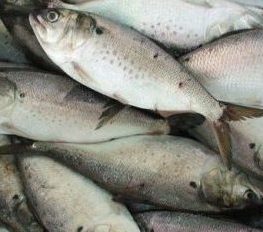
Bill introduced to ban controversial fishing method in Virginia
A bill has been introduced for the next session of the Virginia General Assembly to place a two year moratorium on Atlantic menhaden reduction fishing in Virginia’s portion of the Chesapeake Bay. State Delegate Tim Anderson is sponsoring the bill. Menhaden are a baitfish that serve as forage for a wide number of larger and sportfish species. The method of fishing has been criticized by sportfishing and conservation groups. Omega Protein operates a fishing fleet that targets menhaden. Critics say menhaden numbers have been driven down in the Chesapeake because of it, and that sportfish numbers have dropped as a result. Video, >click to read< -09:37

Atlantic menhaden not overharvested, fisheries commission concludes
An updated menhaden population assessment that takes into account the ecological role of the species as a popular food for other fish deems the coastwide stock to be in good shape. The latest assessment, presented to the Atlantic States Marine Fisheries Commission Aug. 3, incorporates data collected through last year. It concluded that “overfishing is not occurring, and the stock is not considered overfished.” But even with the new methodology, the latest assessment concluded the overall stock was healthy, a finding immediately touted by the Menhaden Fisheries Coalition, a group representing commercial harvesters. >click to read< 10:26
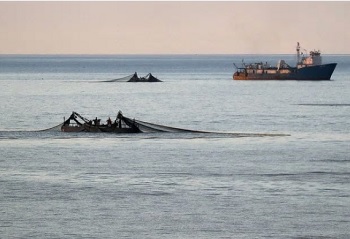
Chesapeake Bay’s menhaden catch cut drastically, along with Omega Protein quota
Virginia is cutting this year’s Chesapeake Bay menhaden catch by more than 80% from last year’s landings in order to end a federal moratorium.
Federal fisheries officials said they’d bar fishing for menhaden in the Bay this year — as long as the fish were headed for Omega Protein’s fish oil and fishmeal plant in Reedville — because the state had not enacted a 41.5% cut to 51,000 tons in Omega’s quota, which had been imposed by the Atlantic States Marine Fisheries Commission in 2017. But the Atlantic States commission has not found that menhaden were overfished. “To be perfectly clear, there is no conservation basis for the Chesapeake Bay cap. No scientific methodology was used in setting the Chesapeake Bay cap by the ASMFC, ,,, >click to read< 15:35

Menhaden regulations have plagued lawmakers for decades.
Every year, the drama has followed the same lines. Some lawmakers and environmentalists concerned about the health of the valuable fishery, the only one managed by the legislature rather than regulators, push to transfer its management to the Virginia Marine Resources Commission. The industry and its unionized fishermen, concerned that regulators will cramp their business, push back. It’s been perhaps the state’s dullest political tug-of-war. But then, this winter, it ended when Omega Protein, the Reedville-based Canadian company that is the largest single player in the U.S. menhaden industry, told a Senate panel that it supported legislation to hand over fishery management to the VMRC. >click to read< 07:39

EDITORIAL: Menhaden harvest limit actually means something
Last week, the Atlantic States Marine Fisheries Commission, the partnership, or “interstate compact,” that sets harvest limits for 27 fisheries up and down the Atlantic Coast, officially accused Virginia of allowing Omega Protein to overfish,,, In a December 2017 press release on the deal, Cooke hinted at a new use: “The animal feed ingredients produced by Omega Protein are an important component in Cooke Aquaculture’s production of healthy Atlantic salmon, making this acquisition a strategic move that greatly enhances Cooke’s vertical integration.” So instead of rockfish, maybe the Bay’s menhaden will be feeding farm-raised salmon in Canada. >click to read< 09:15

The Battle Over Menhaden Harvesting in the Bay
“The menhaden issue is a very complex issue the commission is currently facing,” says Toni Kerns, ASMFC’s director of Interstate Fisheries Management Program and Policy Development. The ASMFC is a group that, under federal law, manages and oversees coastal fisheries including the menhaden species. Essentially, the ASMFC has regulatory authority. Video, >click to read< 08:30

Omega Protein Disappointed by ASMFC Vote on Menhaden Fishery Non-Compliance
Omega Protein is disappointed in today’s vote by the Atlantic States Marine Fisheries Commission (ASMFC) Menhaden Management Board to request Virginia’s menhaden fishery be found out of compliance for exceeding a cap on harvest in the Chesapeake Bay. “In the last decade, we have made a concerted effort to fish outside the Bay whenever weather conditions and the location of the fish have made that possible,” said Monty Deihl,>click to read< 18:34
Regulators say Virginia firm caught more menhaden in Bay than allowed. Feds will decide what happens. – >click to read< 19:33
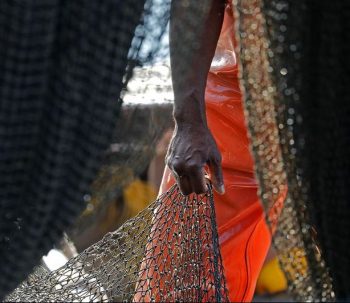
A trip with the lone company chasing menhaden in a 140-year tradition on the Chesapeake Bay
It’s an industry that once made the village of Reedville one of the most prosperous in the state — big, brightly-painted three-story Victorian mansions, bedecked with gingerbread woodwork under their generous shade trees line Main Street in testimony to those long gone days. These days, menhaden are at the center of an obscure, if fiercely fought, political battle over who should catch them where, and whether the Omega Proteins fleet that still sails from Reedville is harvesting too many from the Bay. Among the reasons for that concern: Menhaden are an important food source for striped bass. Photo’s >click to read< 07:54

A Fisherman is dead and 2 Fishermen were rescued after fall overboard from a menhaden fishing vessel
The Coast Guard is leading an investigation after a fisherman died after tumbling overboard while performing maintenance operations. The unidentified victim reportedly fell overboard Wednesday morning. Ocean Harvesters, the contracted company for Omega Protein, says the victim was aboard a menhaden fishing vessel when the incident occurred. A total of three fishermen reportedly went overboard while conducting fishing operations, with two of the men being rescued. >click to read< 20:10

Striped bass are underfed, not overfished
Atlantic States Marine Fisheries Commission, or ASMFC, has determined (again!) that the number of spawning Atlantic striped bass is below the required threshold to maintain proper “recruitment” (newborns), and therefore, sustainable population abundance.,, Certainly, there is a lot of blame to go around, but the ASMFC seems to have only one conclusion: overfishing.,,, What about food?,,, This may be a shocking finding, but foreign-owned Cooke Inc., the owner of Omega Protein, “purse seins” hundreds of millions of pounds of menhaden a year,,, by Bev Landstreet >click to read< 09:36

Fight Against Atlantic Menhaden Certification Moves to Next Round
The objections raised by sportfishing groups in opposition to certification of the industrial Atlantic menhaden fishery as a “sustainable fishery” are scheduled to be heard by an independent adjudicator on July 8 and 9. In March, the Theodore Roosevelt Conservation Partnership (TRCP), Coastal Conservation Association (CCA) and American Sportfishing Association (ASA) filed an objection—which was later combined with a similar objection raised by The Nature Conservancy and Chesapeake Bay Foundation—to the Marine Stewardship Council’s (MSC) recommendation that Omega Protein should receive a certification of sustainability for its U.S. Atlantic menhaden purse-seining operations. >click to read<13:53

New York’s Whales Love Bunker. So Do Fishing Boats. Conflict Ensues.
It has been a bountiful summer for bunker in the waters off New York, and for local whale spotters. Bunker, a favorite food of many larger predators, including whales, are enjoying another year in a decade-long recovery.,,, On Aug. 30, a boat from Omega Protein lowered a net nearly six city blocks long into the water, about 25 miles southeast of the Rockaways, and pulled up about 800,000 pounds of bunker, also known as menhaden. On Sept. 6, Omega returned to the vicinity and hauled out nearly 2 million pounds more. Tom Paladino, a former charter fishing boat captain who started running whale watches from the American Princess in 2010 as local whale sightings began to grow, did not mince words. “We have a major issue with a fishing fleet coming in and taking all the food from the whales,” he told his passengers. Omega says it is doing nothing of the sort and is removing only a tiny fraction of the local menhaden that its spotter pilots have estimated to be in the tens of millions. “The best science shows that this is a completely sustainable fishery and the whale diet is not being impacted at all,” said an Omega spokesman, Ben Landry. > click to read<11:51

A Political Fish Tale That Could Bait Trump
A fish story isn’t one without a bit of exaggeration. Consider menhaden: A bony, little fish used for bait and to make fertilizer, animal feed, dietary supplements and lipstick, it is vital to marine ecology as a bottom-of-the-food-chain staple for other creatures, finned and winged, and as an oceanic janitor, scrubbing waters clean of algae. And menhaden is the protagonist in an economic and political tale that could lead to a confrontation between President Trump and the state that denied him a sweep of the South in 2016: Virginia.,,, And this fish story includes a little-noticed and rare breach between Gov. Ralph Northam and his predecessor, fellow Democrat Terry McAuliffe,,, Racing to the exits, McAuliffe, whose political action committee received $15,000 from Omega in 2017, initiated an appeal to the Atlantic States Marine Fisheries Commission to forgo the new restriction. >click to read<12:24
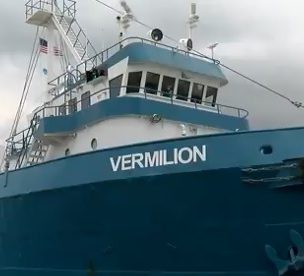
Omega Protein launches largest vessel in Louisiana, F/V Vermilion
Omega Protein is pleased to announce the launch of its newest and largest fishing vessel operating in Louisiana, the F/V Vermilion, to start the 2018 Gulf of Mexico fishing season. The Vermilion marks a significant upgrade to the company’s fleet with state-of-the-art technology and safety features that will improve worker safety and increase efficiency. It is the latest investment made by the company in its gulf fishing communities. >click to read<09:22

House kills fish bill: Does Virginia risk falling out of compliance with menhaden catch limits?
The House of Delegates on Tuesday killed a bill, opposed by an influential Northern Neck commercial fishing operation, that would have brought Virginia into compliance with new menhaden catch limits adopted last fall by a consortium of Atlantic states. Del. Barry Knight, R-Virginia Beach, made a motion to send his House Bill 1610, which had been sent down by Gov. Ralph Northam last month, back to committee, effectively spiking it for the year. In an interview, Knight said he did so in hopes that Northam’s administration and Omega Protein,,>click to read<20:42
Omega Protein Employees and Supporters Call for Fisheries Managers To Protect Menhaden Jobs
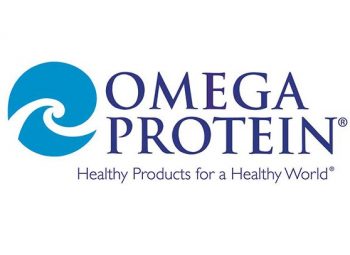 457 Omega Protein employees and supporters have signed a petition urging the Atlantic States Marine Fisheries Commission (ASMFC) to protect the jobs created by the Atlantic menhaden fishery. The petition, part of the public comment process for Amendment 3 to the Atlantic Menhaden Interstate Fishery Management Plan, provides the Commission with the perspectives of those whose livelihoods would be most affected by any new restrictions on the menhaden fishery, and contrasts the outside pressure generated by international environmental groups and individuals who do not live in one of the 15 Atlantic coastal states. The Omega Protein petition, addressed to the ASMFC’s Atlantic Menhaden Fishery Management Plan Coordinator Megan Ware, calls for the ASMFC to continue its current menhaden management approach until its scientific advisers finish their ongoing work developing menhaden-specific ecological reference points. Some environmental groups are advocating for interim reference points that reduce catch levels by up to 80 percent. click here to read the story 20:29
457 Omega Protein employees and supporters have signed a petition urging the Atlantic States Marine Fisheries Commission (ASMFC) to protect the jobs created by the Atlantic menhaden fishery. The petition, part of the public comment process for Amendment 3 to the Atlantic Menhaden Interstate Fishery Management Plan, provides the Commission with the perspectives of those whose livelihoods would be most affected by any new restrictions on the menhaden fishery, and contrasts the outside pressure generated by international environmental groups and individuals who do not live in one of the 15 Atlantic coastal states. The Omega Protein petition, addressed to the ASMFC’s Atlantic Menhaden Fishery Management Plan Coordinator Megan Ware, calls for the ASMFC to continue its current menhaden management approach until its scientific advisers finish their ongoing work developing menhaden-specific ecological reference points. Some environmental groups are advocating for interim reference points that reduce catch levels by up to 80 percent. click here to read the story 20:29
Cooke acquires Omega Protein for nearly USD 500 million
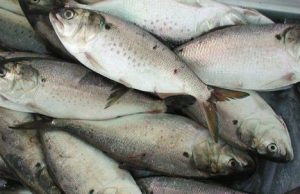 Cooke Aquaculture’s parent company has acquired Texas-based fish oil and fishmeal producer Omega Protein for nearly USD 500 million (EUR 428 million). The agreement has been unanimously approved by the board of directors of each of Omega Protein and Cooke, according to a press release. Cooke Inc., based in New Brunswick, Canada, and Houston-headquartered Omega Protein agreed to a purchase price of USD 22.00 (EUR 18.81) per share for the publicly traded company.,, The transaction, which is expected to close near the end of 2017 or early in 2018, according to Cooke, is subject to the approval of Omega Protein stockholders, certain regulatory approvals, and other customary closing conditions. click here to read the story 14:30
Cooke Aquaculture’s parent company has acquired Texas-based fish oil and fishmeal producer Omega Protein for nearly USD 500 million (EUR 428 million). The agreement has been unanimously approved by the board of directors of each of Omega Protein and Cooke, according to a press release. Cooke Inc., based in New Brunswick, Canada, and Houston-headquartered Omega Protein agreed to a purchase price of USD 22.00 (EUR 18.81) per share for the publicly traded company.,, The transaction, which is expected to close near the end of 2017 or early in 2018, according to Cooke, is subject to the approval of Omega Protein stockholders, certain regulatory approvals, and other customary closing conditions. click here to read the story 14:30
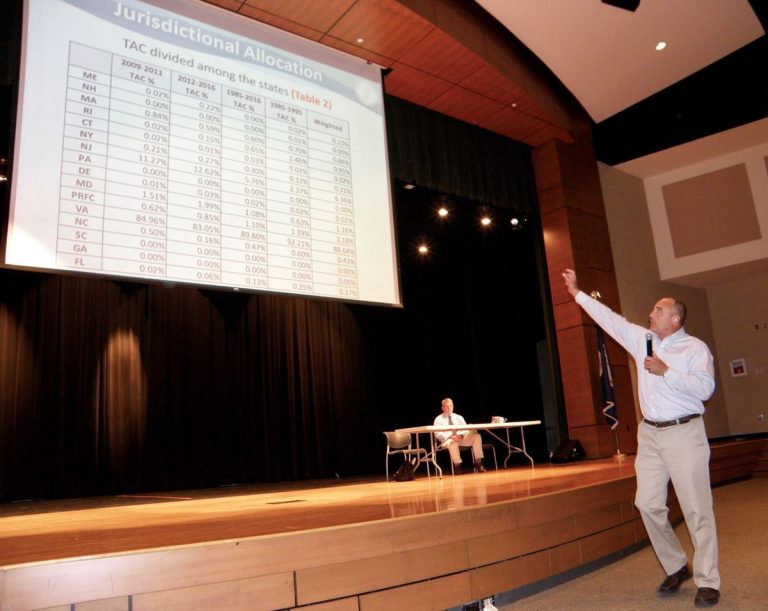
Menhaden battle once again pits Virginia against Northern states
Five years ago, the Atlantic States Marine Fisheries Commission cut the menhaden harvest by 20 percent, forcing the largest employer in the rural tip of the Northern Neck, Omega Protein, to lay off workers and decommission a ship.,, Since then, ASMFC, which manages fisheries from Maine to Florida, changed its method of assessment and says stocks are now healthy. It began easing catch limits to where the quota is now only about 6 percent short of the 212,000 metric tons it once was. Omega, which catches a half-billion fish each year, replaced two of its seven ships this year with larger, more efficient ships and rehired some of its employees. But the company sees a new problem. click here to read the story 11:27
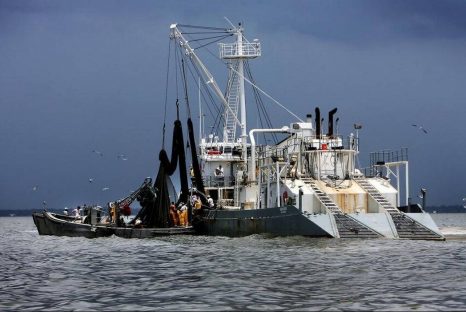
Why Omega Protein has stirred up a big stink about a small fish
The disagreement between activists and Omega Protein depends on the answer to a simple question: Are there enough menhaden in the Gulf of Mexico? Omega says there are plenty, and it wants to keep it that way. Members of the Sierra Club Gulf Coast Group, the Coastal Conservation Association and other groups have their doubts. It’s an argument recreational fishermen and conservationists have been having with Omega for years. Omega has a menhanden reduction plant in Moss Point and regularly fishes the Mississippi Sound. The opposition to its activities began anew with vigor earlier this year when Omega began seeking a “certified sustainable seafood” designation from the Marine Stewardship Council. MSC is a London-based nonprofit (although it collects royalties from licensing its “ecolabel”) that was set up in 1997 by the World Wildlife Fund and Unilever, a global conglomerate that was at the time one of the world’s largest producers of frozen seafood. click here to read the story 10:28
Access to Surfclam Fishing Grounds Studied by SCeMFiS Scientists in Research Survey Cruise Southeast of Nantucket Island
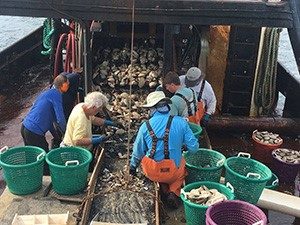 August 11, 2017, Boston, MA. – The scientists of the Science Center for Marine Fisheries (SCeMFiS) recently completed a survey of the surfclam fishery area southeast of Nantucket Island to provide information regarding surfclam stock status and habitat to ensure continued resource access by local surfclam vessels. Surveys were successfully conducted in 4 days aboard the F/V Mariette sailing from New Bedford, MA… SCeMFiS scientific projects are unique in that they respond directly to the scientific needs of the fisheries managers in collaboration with the commercial fishing industry while upholding strict quality scientific standards and procedures. click here to read the press release 15:07
August 11, 2017, Boston, MA. – The scientists of the Science Center for Marine Fisheries (SCeMFiS) recently completed a survey of the surfclam fishery area southeast of Nantucket Island to provide information regarding surfclam stock status and habitat to ensure continued resource access by local surfclam vessels. Surveys were successfully conducted in 4 days aboard the F/V Mariette sailing from New Bedford, MA… SCeMFiS scientific projects are unique in that they respond directly to the scientific needs of the fisheries managers in collaboration with the commercial fishing industry while upholding strict quality scientific standards and procedures. click here to read the press release 15:07
My Turn: Ben Landry: Have honest discussion on fishing
 In his July 7 column (“Opinions on changes toquota are divided”), Capt. Dave Monti makes multiple inaccurate claims about the biology and management of menhaden — claims that someone who advises menhaden regulators at the Atlantic States Marine Fisheries Commission should know do not conform to the latest menhaden science. Mr. Monti mischaracterizes the health of the Atlantic menhaden stock when he says it is “on the rebound, due to the first-ever catch quota put into place in 2012.” As an ASMFC advisor, Mr. Monti should know that the 2012 catch quota was based on a stock assessment, later determined to be faulty, that showed menhaden was being overfished. That later-disproven science led the commission to unnecessarily slash menhaden catch rates by 20 percent, hurting those who make their living in the fishery. click here to read the rest, it gets better! 19:24
In his July 7 column (“Opinions on changes toquota are divided”), Capt. Dave Monti makes multiple inaccurate claims about the biology and management of menhaden — claims that someone who advises menhaden regulators at the Atlantic States Marine Fisheries Commission should know do not conform to the latest menhaden science. Mr. Monti mischaracterizes the health of the Atlantic menhaden stock when he says it is “on the rebound, due to the first-ever catch quota put into place in 2012.” As an ASMFC advisor, Mr. Monti should know that the 2012 catch quota was based on a stock assessment, later determined to be faulty, that showed menhaden was being overfished. That later-disproven science led the commission to unnecessarily slash menhaden catch rates by 20 percent, hurting those who make their living in the fishery. click here to read the rest, it gets better! 19:24
CCA is telling fish tales about Omega Protein
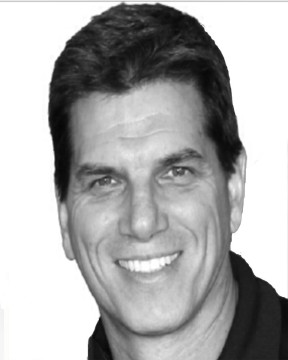 On April 2, the Sun Herald published an op-ed from the spokesman of the Coastal Conservation Association — Mississippi, F.J. Eicke (“A most important fish raises need for public scrutiny”), that was filled with more holes than a fisherman’s net. Sadly, time and time again, Mr. Eicke has demonstrated dismissiveness toward sustainable fisheries and the hardworking men and women of Mississippi’s commercial fishing industry. A major contention offered by Mr. Eicke is that Mississippi’s resident menhaden stock is troubled. This statement is 100 percent incorrect and is little more than a scare tactic. There is no such thing as “Mississippi menhaden.” Due to their very nature — their biology and habitat — menhaden are a Coastwide migratory species, which is why menhaden stock assessments are conducted on a Coastwide basis. Read the rest here 21:47
On April 2, the Sun Herald published an op-ed from the spokesman of the Coastal Conservation Association — Mississippi, F.J. Eicke (“A most important fish raises need for public scrutiny”), that was filled with more holes than a fisherman’s net. Sadly, time and time again, Mr. Eicke has demonstrated dismissiveness toward sustainable fisheries and the hardworking men and women of Mississippi’s commercial fishing industry. A major contention offered by Mr. Eicke is that Mississippi’s resident menhaden stock is troubled. This statement is 100 percent incorrect and is little more than a scare tactic. There is no such thing as “Mississippi menhaden.” Due to their very nature — their biology and habitat — menhaden are a Coastwide migratory species, which is why menhaden stock assessments are conducted on a Coastwide basis. Read the rest here 21:47
Mississippi Commission on Marine Resources denies request for 1-mile menhaden fishing limit
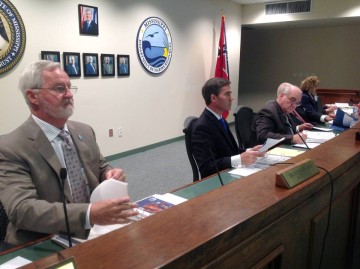 The Mississippi Commission on Marine Resources denied Jackson County’s request to limit menhaden fishing to at least a mile off the county’s mainland. The vote was unanimous and came after the commission listened to arguments from both sides of the issue. On March 7, the Jackson County Board of Supervisors voted 3-2 to ask the state to limit menhaden boats to 1 mile offshore. The move would have closed 22 square miles of the Sound to commercial fishing by the company Omega Protein of Moss Point. Both the Coastal Conservation Association and Omega Protein went before the CMR. In the final vote, it came down to science and concern for industry. Read the article here 19:23
The Mississippi Commission on Marine Resources denied Jackson County’s request to limit menhaden fishing to at least a mile off the county’s mainland. The vote was unanimous and came after the commission listened to arguments from both sides of the issue. On March 7, the Jackson County Board of Supervisors voted 3-2 to ask the state to limit menhaden boats to 1 mile offshore. The move would have closed 22 square miles of the Sound to commercial fishing by the company Omega Protein of Moss Point. Both the Coastal Conservation Association and Omega Protein went before the CMR. In the final vote, it came down to science and concern for industry. Read the article here 19:23
Omega Protein : Conservation groups and legislators look to change menhaden regulations
 With the lights of the Chesapeake Bay Bridge-Tunnel twinkling in the background, Barry Knight looked at a room full of supporters and realized he no longer was alone. For nearly a decade, the Republican member of the Virginia House of Delegates has been trying to wrestle the menhaden fishing industry from the grasp of the state’s General Assembly. An environmentally conscious angler and a rural Virginia Beach pig farmer, he has wondered for years why menhaden are the only species in Virginia waters that are not controlled by the Virginia Marine Resources Commission. Read the article here 15:31
With the lights of the Chesapeake Bay Bridge-Tunnel twinkling in the background, Barry Knight looked at a room full of supporters and realized he no longer was alone. For nearly a decade, the Republican member of the Virginia House of Delegates has been trying to wrestle the menhaden fishing industry from the grasp of the state’s General Assembly. An environmentally conscious angler and a rural Virginia Beach pig farmer, he has wondered for years why menhaden are the only species in Virginia waters that are not controlled by the Virginia Marine Resources Commission. Read the article here 15:31
Dead menhaden wash up on Eastern Shore after fish spill from Omega Protein boat
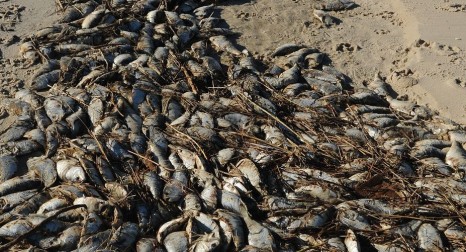 Last Wednesday, said Omega spokesman Ben Landry, the John Dempster was pulling in hundreds of thousands of menhaden from the bay when the net apparently ripped on some bottom debris and dumped about 75,000 dead fish into the water. It’s an unfortunate accident that occurs maybe two or three times a year, he said. Omega notified the Virginia Marine Resources Commission, he said. On Friday, he said, they got reports that the wave of dead menhaden would strike land, probably around Smith Beach and Cherrystone Inlet. Read the rest here 21:47
Last Wednesday, said Omega spokesman Ben Landry, the John Dempster was pulling in hundreds of thousands of menhaden from the bay when the net apparently ripped on some bottom debris and dumped about 75,000 dead fish into the water. It’s an unfortunate accident that occurs maybe two or three times a year, he said. Omega notified the Virginia Marine Resources Commission, he said. On Friday, he said, they got reports that the wave of dead menhaden would strike land, probably around Smith Beach and Cherrystone Inlet. Read the rest here 21:47






